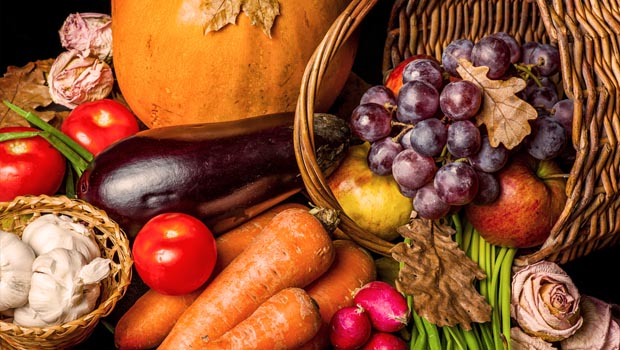Superfoods for People with Type 1?

Craig Idlebrook contributed to this article.
Every adult with Type 1 knows, at least basically, how to count carbs and estimate the amount of insulin needed to cover those carbs. Fewer know how to seek out the foods that may help in maintaining good blood glucose levels. We’ve done some research to compile some food news for people with Type 1 diabetes.
One word of caution, however: Most of the available research on food and diabetes has been done on mice and/or is focused on Type 2 diabetes.
Your Shopping Cart Should be Filled with These 10 Things
The American Diabetes Association has designated 10 invaluable foods for people with diabetes, based on glycemic index score and nutritional value:
1. Beans
2. Dark-green leafy vegetables
3. Citrus fruit
4. Sweet potatoes
5. Berries
6. Tomatoes
7. Fish high in Omega-3 fatty acids
8. Whole grains
9. Nuts
10. Milk and yogurt.
Protein: The Jury’s Still Out
The Paleo diet is all the rage now, and protein would seem like a natural choice of something to load up on in your diet, especially since there is evidence that the glucose from protein doesn’t make it into your bloodstream to mess with your blood sugar levels. However, for a long time now, scientists have warned that there is no body of evidence that suggests people with diabetes should consume more protein than people without diabetes.
That being said, there is a pair of recent studies which suggest that protein may one day be suggested as a way to help control blood glucose levels: A study published in the journal Nature found that mice with the equivalent of diabetes achieved great glucose levels with daily injections of a protein called FGF1. Meanwhile, a 2014 Tel Aviv University study found that consuming whey protein concentrate before breakfast helped with after-meal blood sugar spikes. Researchers believe this is because the whey seems to encourage insulin secretion in the body (which may not be much help if you are past the honeymoon period in Type 1 diabetes).
Magic Foods?
Remember kale? The blogosphere loves to anoint a new food as the next superfood that can cure all ills…and they have studies to prove it. Often, the study provided as evidence is small and there hasn’t been a lot of follow-up, but the results are tantalizing. And don’t forget about the celebrity endorsement, when famous people suddenly gain the authoritative power of nutritionists, like when one of the Kardashians claimed cucumbers cured diabetes.
The good news is that most superfoods aren’t going to hurt you, since they are usually nutritionally sound. That being said, you shouldn’t bet the farm on a food magically making your blood sugars behave.
Here are a few foods that have been studied for possible benefits to people with diabetes:
Pumpkins: In 2009, Japanese researchers found that non-obese diabetic rats who were fed pumpkin paste tended to have better after-meal glucose control over rats not given pumpkin paste. A 2007 Chinese study had similar findings. Scientists speculate that the compounds trigonelline and nicotinic acid act as blood-sugar controlling agents. These were small studies, and even the researchers warned people not to jump to conclusions.
Garlic: In a 2011 study, researchers in India posted a study showing that diabetes-prone rats who were fed raw garlic exhibited greater insulin sensitivity than their better-breath-smelling counterparts. Researchers warn that garlic’s power to help people with diabetes has not yet been proven.
Cocoa: While we all want to believe that consuming chocolate bars is the key to good blood sugar levels, the truth is a bit more complicated, and bittersweet. Harvard Medical school researcher Eric L. Ding and his team analyzed some two dozen studies of cocoa and human health and found that cocoa powder does seem to improve insulin sensitivity. This might be useful for people with Type 1 diabetes in the honeymoon period. However, to get the full health benefits of cocoa, you would have to consume a huge amount of the stuff, and it should be noted we’re talking about cocoa, not the chocolate bars found in the candy aisle.
Food study is still in its infancy. While there may not be one superfood out there that can fix your blood sugar levels, there are a lot of foods out there that can help you stay healthy on a day-to-day basis. It’s important to observe how your body’s blood sugar levels react to certain foods, and to consult with a healthcare provider about what dietary choices might work best for you.